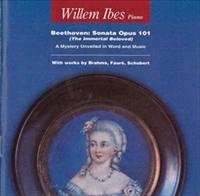Welkom op mijn Website!
Willem Ibes
Let us start, in ascending order of importance, with myself. Born in Nijmegen, The Netherlands, a long, long time ago, I still have a great affection for the country of my birth; this explains the Dutch heading on my Home-page welcoming you to this Web site. I am a classical pianist by trade and have a modestly successful career as a performer. My "bread-and-butter" has been and remains my teaching at St. John's University in Minnesota. Over the years I have taught a variety of subjects and at present I teach piano on all levels. I began Zen meditation in 1970 and have taught many intensive three- week meditation sessions for our students. Greatly influenced in my own work by Lao-tsu's Tao Te Ching and the Zen masters I wanted to express my gratitude and admiration for their wisdom and started teaching and performing in the Far East, first in Japan in 1989 and the following year in main land China as well. I have returned there almost each year since.
"Min Ceme At" The Romantic Virus
My first graduating class (music history and form analysis) had presented me, in 1959, with my first "Ur-text" (not yet named as such), Bach's Klavier Büchlein für Friedemann Bach. A scholarly publication indeed with the text just as J.S. Bach had written it. Still, the good editor, Hermann Keller who, with obvious restraint, had "in general" abstained from "indicating articulation" could not restrain himself any further and indicated phrasing-markings "durch die unauffåligen kleinen Trennungsstriche" ("by means of unobtrusive small division marks"), in cases where "differences of opinion seemed excluded." And thus did the "Romantic virus" add yet another victim to its long list of conquests. The piano scores I studied were edited by Peters, Schott and (God forbid) Schirmer. In the mid-seventies the Henle publications of Bach, Mozart and Beethoven threw a whole new light on the elements of phrasing and articulation. I myself was of course seriously infected by the Romantic virus and even though these "Ur-text" editors no longer explicitly indicate phrasing preferences, the way e.g. fingerings are suggested for certain passages leaves no doubt that even now the epidemic is in full bloom. What is this virus that has stealthily burrowed its way into our interpretations of Baroque, Classical, and a good number of later composers? It is simply the almost irresistible urge to resolve e.g. the dominant with the tonic as soon as possible (instant gratification) and, with even greater compulsion, to always play across the bar line or into the stronger beat of the measure (in a 4/4 measure into the third beat, in a 6/8 measure into the fourth beat). If my name is "Wim Ibes" and someone writes or calls me "Wimi Bes" I must correct him. An obvious requisite for meaning, or intelligibility, in language as well as music, is that letters (notes), words (motifs), and sentences are grouped correctly. A word like min ceme at makes no sense, whereas mincemeat is clear. Well, it is my contention that for almost two centuries now we have made and continue to make mincemeat of Beethoven's compositions, as well as the compositions of a host of other composers. More (much more!) in my article "Cure for the Romantic Virus - Principles of metrical/mathematical analysis."
Who is the "Immortal Beloved?"
 Who is the "Immortal Beloved"? Could it be
Baroness Dorothea von Ertmann, described by both
Schindler and Kapellmeister Reichardt as "a
beautiful tall woman of noble appearance and
soulful countenance"? Reichardt speaks of "such
strength united with the most intimate
tenderness... a soul sang at the end of each of
her fingers" especially when it came to
Beethoven's compositions. "She was often able to
bring our Grand Master to great admiration"
Schindler wrote of Dorothea's regular
appearances on the Sunday matinees organized by
Carl Czerny where Beethoven himself was
frequently present. Schindler is especially
impressed by the incomparable way in which the
Baroness interpreted the Sonata dedicated to
her, Opus 101, of which she was able "to grasp
Beethoven's most hidden intentions, as if they
had been written under her eyes."
Who is the "Immortal Beloved"? Could it be
Baroness Dorothea von Ertmann, described by both
Schindler and Kapellmeister Reichardt as "a
beautiful tall woman of noble appearance and
soulful countenance"? Reichardt speaks of "such
strength united with the most intimate
tenderness... a soul sang at the end of each of
her fingers" especially when it came to
Beethoven's compositions. "She was often able to
bring our Grand Master to great admiration"
Schindler wrote of Dorothea's regular
appearances on the Sunday matinees organized by
Carl Czerny where Beethoven himself was
frequently present. Schindler is especially
impressed by the incomparable way in which the
Baroness interpreted the Sonata dedicated to
her, Opus 101, of which she was able "to grasp
Beethoven's most hidden intentions, as if they
had been written under her eyes."
Want to learn more (much more!) about "die Unsterbliche" as well as the two last Beethoven sonatas? Read and listen to " A Beethoven Triptych."